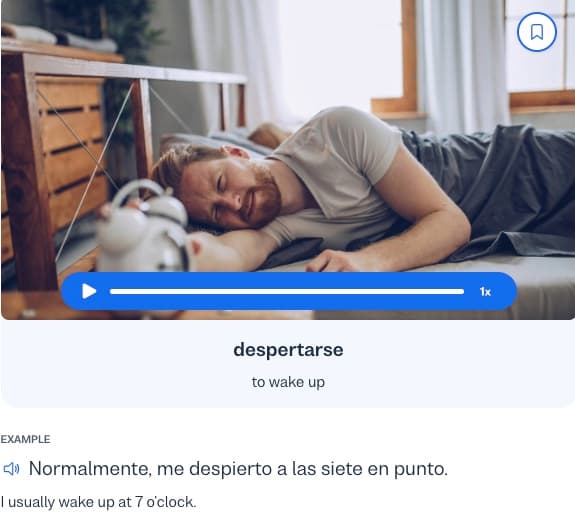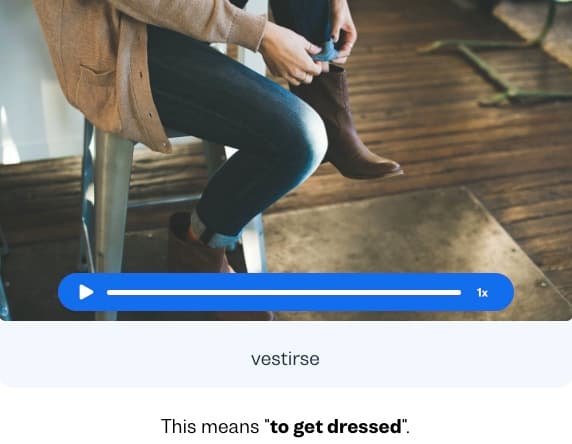I want to learn...
As with most languages, without verbs, you can’t really communicate effectively in Spanish. Grasping the basics of Spanish verbs and getting an overview of how these verbs are conjugated is essential for effective communication.
In this article, we will explore the structure of Spanish verbs, their common rules, and exceptions, as well as basic temporal conjugations. As a result, you’ll be equipped with the knowledge needed to navigate this crucial area of the language.
Starting with Spanish verb conjugation
In Spanish, verbs change more than they do in English. This alteration is called conjugation and involves adjusting the verb to fit the subject pronoun, tense and mode.
Let’s look at the table of subject pronouns to start before we dive into Spanish verb conjugation:
Subject pronouns
| English | Spanish |
|---|---|
| Me | Yo |
| You (singular, informal) | Él, Ella, Eso, Usted (formal) |
| We | Nosotros (masculine), Nosotras (feminine) |
| You (plural) | Vosotros (Spain) |
| They | Ellos (masculine), Ellas (feminine), Ustedes |
From here it becomes easy to conjugate, since most verbs simply follow a set of rules no matter the tense you’re speaking in.
Key conjugation rules and patterns
Although Spanish is one of the most complex Latin languages, you can become conversational by mastering a few of the basic rules.
Regular verbendings
For regular -ar verbs, the endings are: -o, -as, -a, -amos, -áis, -an
For regular -er verbs, the endings are: -o, -es, -e, -emos, -éis, -en
For regular -ir verbs, the endings are: -o, -es, -e, -imos, -ís, -en
Note: The second plural (vosotros) may not always have an accent mark. That will depend on a few other rules, like the syllable count, diphthong or hiatus, etc.
Table of regular verb endings
| Person | -ar example | -er example | -ir example |
|---|---|---|---|
| Yo | Hablo (I speak) | Como (I eat) | Vivo (I live) |
| Tú | Hablas | Comes (You eat) | Vives (You live) |
| Él / Ella / Usted | Habla (He/She/You speak) | Come (He/She/You eat) | Vive (He/She/You live) |
| Nosotros | Hablamos (We speak) | Comemos (We eat) | Vivimos (We live) |
| Vosotros | Habláis (You speak) | Coméis (You eat) | Vivís (You live) |
| Ellos / Ellas / Ustedes | Hablan (They/You speak) | Comen (They/You eat) | Viven (They/You live) |
Irregular verbs
Some commonly used verbs have irregular conjugations that must be memorized. Check out the three most common examples below:
"Ser" (to be).
“Saber” (to know).
“Tener” (to have).
Stem-changing verbs
Certain verbs undergo stem changes in specific conjugations.
The most common is the E → IE:"Querer"(to want)
Yo quiero (I want)
Tú quieres (You want)
Él / Ella / Usted quiere (He / She / You (formal) want)
Nosotros / Nosotras queremos (We want)
Vosotros / Vosotras queréis (You (plural) want)
Ellos /Ellas / Ustedes quieren (They/You (plural, formal) want)
While some other verbs require orthographic changes to maintain the original sound.
Like going from U → UE. For instance:"Jugar"(to play)
Yo juego (I play)
Tú juegas (You play)
Él / Ella / Usted juega (He / She / You (formal) plays)
Nosotros / Nosotras jugamos (We play)
Vosotros / Vosotras jugáis (You (plural) play)
Ellos / Ellas /Ustedes juegan (They / You (plural, formal) play)
Reflexive verbs
Reflexive verbs indicate actions done to oneself. They require reflexive pronouns and have specific conjugation patterns.
For example:"Lavarse"(to wash oneself)
Yo me lavo (I wash myself)
Tú te lavas (You wash yourself)
Él / Ella / Usted se lava (He / She washes himself / herself / You (formal) wash yourself)
Nosotros / Nosotras nos lavamos (We wash ourselves)
Vosotros / Vosotras os laváis (You all wash yourselves)
Ellos /Ellas / Ustedes se lavan (They wash themselves / You (plural, formal) wash yourselves)
Past tense conjugations
The simple past tense (pretérito indefinido) is the basic form used to express actions that were completed in the past. The conjugation patterns differ for -ar, -er, and -ir verbs. Although -er and -ir share the same pattern. Let’s have a look at some examples:
For the verb
Yo hablé (I spoke)
Tú hablaste (You spoke)
Él / Ella / Usted habló (He / She / You formal spoke)
Nosotros / Nosotras hablamos (We spoke)
Vosotros / Vosotras hablasteis (You (plural) spoke)
Ellos / Ellas / Ustedes hablaron (They / You (plural, formal) spoke)
Comer
Yo comí / viví (I ate / lived)
Tú comiste / viviste (You ate / lived)
Él / Ella / Usted comió / vivió (He / She / You (formal) ate / lived)
Nosotros / Nosotras comimos / vivimos (We ate / lived)
Vosotros/Vosotras comisteis / vivisteis (You (plural) ate / lived)
Ellos / Ellas / Ustedes comieron / vivieron (They / You (plural) ate / lived)
Future tense conjugations
Finally, to speak about things that are yet to happen, the simple future tense will be your best friend.
To form the future tense, add the corresponding endings to the infinitive of the verb, which are -é, -ás, á, -emos, -éis, and -án.
In this case it doesn’t matter which infinitive it is, the pattern is always the same.
Yo hablaré (I will speak)
Tú hablarás (You will speak)
Él / Ella / Usted hablará (He/She/You (formal) will speak)
Nosotros / Nosotras hablaremos (We will speak)
Vosotros / Vosotras hablaréis (You (plural) will speak)
Ellos / Ellas / Ustedes hablarán (They / You (plural, formal) will speak)
Common mistakes to avoid
1. “False friends”
Some words sound or look similar to English words, but will have different meanings in Spanish. This is due to the root of the word being similar, but Spanish is a Latin language, while English is Anglo saxon. (If you are interested in knowing more about other languages derived from Latin, check out our article about romance languages)
You might look at a word like"realizar"and not notice it means "to accomplish" rather than "to realize." Keep this in mind when expressing yourself in Spanish.
2. Accurate pronoun usage
If you want to master the Spanish language it is important to properly use reflexive pronouns when conjugating reflexive verbs. For example, "me" (I get up) instead of "yo" (I pick (something) up).
Spanish verbs: Recap
Spanish verbs and their conjugation may appear daunting at first, but with practice and a good understanding of the rules, you can pick it up rather quickly.
Remember to study and practice regularly. And pay attention to verb and subject agreement, as well as accurate pronoun usage.
With dedication and perseverance, you will gain confidence in using and conjugating Spanish verbs, opening the door to effective communication and language fluency.
Newlanguages


